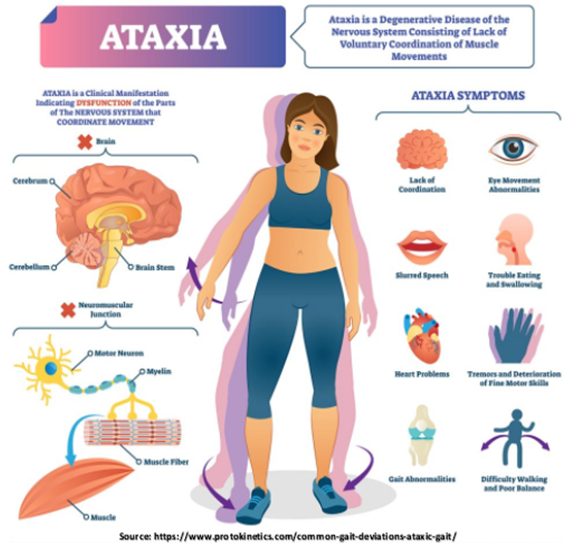The Best Ataxia Treatment in Guntur
Ataxia is an abnormal lack of coordination that can produce a stumbling posture, difficulty with fine motor functions and eyesight, and sometimes speech impairments. Ataxia is a sign of a variety of medical conditions, including vitamin deficiency and genetic abnormalities.
Dr. Rao’s Hospital, one of the best neurology hospital in Guntur, offers the most effective ataxia treatment to help manage ataxia symptoms that worsen over time.
Our founder, Dr. Mohana Rao, is one of the best neurosurgeon in Guntur. He aims to provide comprehensive and efficient ataxia treatment in Guntur to assist the patient in navigating both symptoms and underlying issues.
Continue reading this article to know about ataxia, its causes, symptoms, diagnosis, and treatment.

First, let’s know, What is Ataxia?
Ataxia is a term used to describe a set of neurological illnesses (nervous system diseases) that impede movement and coordination. Balance, coordination, swallowing, and speech are all common problems for those with ataxia.
Ataxia results from damage to the region of the brain (cerebellum) that controls movement. Ataxia can strike anyone at any age. It is usually progressive, which means it becomes worse with time.
Now, let’s discuss,
What are the Types of Ataxia?
Ataxia comes in a variety of forms. The symptoms and the cause of their emergence determine the type of ataxia. Knowing the type of ataxia can assist our neurologist in Guntur in determining the severity of the problem and develop a treatment plan.
Cerebellar Ataxia
This type of ataxia develops due to dysfunction in the cerebellum, a part of the brain that helps with sensory processing, coordination, and motor control.
Sensory Ataxia
A person’s awareness of the relative position of surrounding body parts is known as proprioception. It is a kind of ataxia that arises when proprioception is lost. It is a sense that determines if the body is moving with sufficient effort and provides feedback on the relative positions of bodily parts.
Vestibular Ataxia
The vestibular system, which is involved in hearing, is affected by this type of ataxia. It can occur due to auditory nerve injury.
Let’s know,
What are the Symptoms of Ataxia?
Symptoms and onset times differ depending on the type of ataxia. Even within the same family with the same type of ataxia, there are differences. However, the following are among the disease’s most common symptoms:
- Difficulty in completing tasks like eating, writing, or buttoning a shirt
- Slurred speech
- Difficulty in maintaining balance
- Reduced coordination
- Difficulty in swallowing
- Nystagmus
What are the Causes of Ataxia?
Some common causes of ataxia are:
- Heredity
- Damage to the brain or spinal cord
- Vitamin B-12 deficiency
- Exposure to toxic chemicals
- Brain tumour
- Cerebral palsy, multiple sclerosis, and some other neurological conditions
Let’s know,
How is Ataxia diagnosed?
When diagnosing ataxia, our proficient neurologist in Guntur investigates a variety of factors. To identify if the patient has ataxia and, if so, what type, the neurologist will perform a physical exam and ask about the medical and family history of the patient.
Neurologists may use other tests to determine the etiology and classification of ataxia. These are some of them:
MRI: An MRI is a type of imaging exam that allows doctors to study the brain and assist them in figuring out what’s causing the ataxia.
Blood tests: Assist in determining whether a stroke, tumor, or infection caused the condition.
Genetic testing: It helps diagnose hereditary ataxia.
Now, let’s know,
How is Ataxia Treated?
- Issues of coordination and balance: Adaptive devices like walking sticks, crutches, walkers, and wheelchairs can help a person maintain independence. Some home modifications, such as wheelchair accessibility, may be required.
- Tremor, stiffness, muscle spasms, and weakness: Our neurologist may prescribe medication and physical or occupational therapy to assist a person increase their strength, mobility and find new ways to accomplish tasks.
- Curvature of the spine: Our expert ataxia doctor in Guntur may suggest orthopedic treatment to treat this spinal condition.
- Depression: Counseling and medication may be beneficial in treating ataxia-associated depression.
- Difficulties in speaking: A speech therapist can assist with communication impairments and muscle control to aid swallowing, coughing, and choking. A speech therapist can help the person in learning how to utilize speech aids if necessary.
- Deficiencies: People who have a deficiency may benefit from vitamin supplements, a particular diet, or both. Gluten sensitivity is linked to ataxia, so following a gluten-free diet can be beneficial.
- Immunity issues: Gamma-globulin injections enhance the immune system. It may treat ataxia-telangiectasia.
- Uncontrollable eye movements: Medication may help with this problem
Book an appointment at Dr. Rao’s Hospital to receive effective and cost-efficient ataxia treatment in Guntur from experienced neurologists.
Frequently Asked Question
What is the impact of ataxia on daily life?
Ataxia is a condition in which the capacity to coordinate voluntary motions is lost. The limbs, trunk, neck, head and breathing, swallowing, language, pharynx, larynx, and other structures may be affected. These issues get more severe over time.
Is it possible to recover from ataxia?
There is no permanent cure for ataxia. The doctors determine the prognosis by the type, etiology, and severity of the condition. However, some varieties of genetic ataxia can lower a person’s life expectancy.
Is it true that exercise can help with ataxia?
The basic treatments for ataxia include neuromotor exercises, and physical therapy focused on coordination and balance. It has been demonstrated to improve or stop the progression of functional loss. Balance training has been shown to increase the quality of walking while also lowering the danger of falling.
How long does ataxia last?
Some forms of ataxia show worsening symptoms. People with the disease have a shorter life expectancy than the general population. Many people live well into their 30s, and some even into their 60s and beyond.
Enquiry Now

